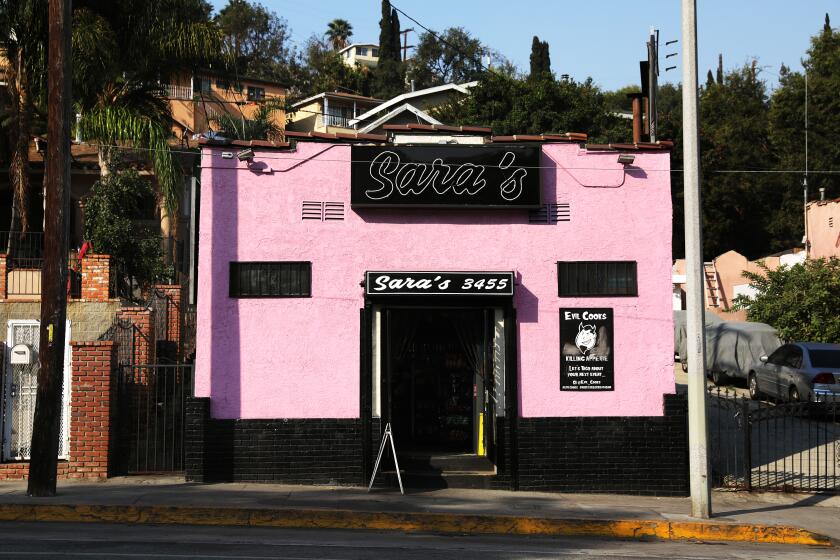A baker’s dozen of sad goodbyes
The doughnut man is on his last roll.
His ancient Helms Bakery truck -- the battered 1965 van with the “Helms” sign repainted to read “Herms Bakery” -- is making its final rounds through the City of Commerce and Montebello.
After 54 years making door-to-door deliveries of bread and pastries to people in southeast Los Angeles County, Herman Langley is retiring.
Langley, who will turn 79 next month, is a throwback to a more gentle era. Friendly and trusting, he is a reminder of a time when competing bakery trucks cruised the streets of Los Angeles and its suburbs, tooting distinctive whistles and selling 5-cent crullers and 19-cent loaves of bread at the curb.
It was a sweet service for customers and a decent job for doughnut men.
Homemakers and schoolchildren had easy access to fresh rolls and pastries in communities that sometimes had few neighborhood markets. Langley kept running tabs in a spiral notebook on the dashboard for those who needed to buy baked goods on credit.
When children clutching a few pennies flagged him down to get a doughnut, Langley was cheerful and courteous. After each purchase, he would escort the youngsters safely back across the street.
Children never forgot the doughnut man. One of them even married him when she grew up.
“My second wife would buy doughnuts from me when she was 12 years old. She recognized me on my route in Montebello when she was 27. I was with Linda for 28 years until she passed away,” Langley says wistfully.
In the early days, gasoline was cheap, so bakery truck drivers could make a living even if they only earned a few pennies on each item.
Like his competitors in official Helms Bakery and Golden Crust Bakery trucks, Langley purchased his bread and cakes wholesale and sold them at retail prices. Driving slowly through residential streets, he announced his arrival by pulling a lever next to the steering wheel that pumped a tiny bellows, blowing the whistle.
He served rolls and doughnuts from wooden drawers tucked in the back of the van. Part of the cabinet was chilled so that creampuffs and berry pies stayed fresh even on the hottest summer day.
“We’d pay 3 cents for a doughnut and sell it for 5 cents. I’d sell 36 or 37 dozen doughnuts a day. We made about a 33% profit,” Langley says.
Over the years, Langley drove nearly 609,000 miles covering his 45-mile bread route. He wore out six trucks -- each purchased from West Los Angeles-based Helms Bakery. Always willing to sell surplus or used trucks, Helms also sold wholesale bakery goods to its own drivers’ competitors.
Helms Bakery went out of business in 1969. Langley blames part of the demise on an effort by Helms drivers to unionize.
“I could never understand why they tried to do that,” he says of the Helms drivers. “They were independent, just like me. We all bought our own stuff and resold it.”
Langley purchased his current truck -- a former Helms van still plastered with county health license decals dating to 1968 -- about 16 years ago. Unlike the panel trucks that required him to step outside and walk to the back to reach the bakery drawers, the boxy Chevrolet van let him stay inside and keep dry in rainy weather.
But by then, life was starting to change for doughnut men.
Small, local wholesale bakeries began closing. That forced Langley to make a 30-mile round trip to downtown Los Angeles to buy his daily stock. The extra travel time meant that he got a late start on his route, forcing him to drive after dark most days to complete it.
When the lever-operated whistle quit working, there were no parts to fix it, so Langley installed a bell outside the driver’s window. When the refrigerator broke, he stored pies in an ice chest. The cooler held sodas, tortillas and other snacks that he sold toward the end of his career.
He struggled to keep his prices down. “They raised the price of doughnuts on me four times,” he says of his supplier. “But I never raised mine. I sold my doughnuts for 35 cents right to the end.”
But the streets on his route were becoming meaner. Several times, robbers tried to grab money from the van’s cash drawer. Once, a thug attempted to hijack the truck. Vandals sometimes sprayed graffiti on the rear and sides of the van when it stopped for customers. Langley had to repeatedly repaint his yellow van.
In the end, another of his childhood customers, Christine Rosales, now 49, began accompanying Langley on his route to look out for him.
“He’s a good man with a good heart,” she said. “He trusts everybody.”
So no wonder his customers were stunned when Langley informed them that he intended to quit Oct. 5. He picked the date to correspond with the Oct. 11 renewal deadline for his van’s annual Los Angeles County health department permit.
He has spent the last month driving his route, slowly collecting about $6,000 in unpaid credit he has extended to his customers over the years. He says no one is stiffing him, although some have requested extended payment plans -- and one customer who owed $133 died three weeks ago, before Langley could collect.
“It broke my heart when he told me he was retiring,” customer Tony Thorpe said. “This is a vacuum you’ll never be able to fill. A lot of people, senior citizens, the disabled, depended on him. He’d go out of his way to help them. He’d walk up to their house and take orders through their window.”
Thorpe, a 62-year-old City of Commerce artist, said he has been Langley’s customer for half a century. “He’s the last of a breed. He was dedicated to his business and to his people.”
Quitting hasn’t been easy. It was hard for Langley to say goodbye to those he’d watched grow from children to adults with their own children and grandchildren.
And there was a surprise from the county.
Health department officials told the doughnut man he will still be assessed the $283 license renewal fee even though he’s retired. If he doesn’t pay, authorities will place a lien on Langley’s Santa Fe Springs home.
“I’m sorry. But that’s the way it is. The new fiscal year began July 1, even though the renewal notices weren’t sent out until Sept. 5, due Oct. 11,” said Rosemary Flores, a clerk with the health department vehicle inspection program.
That’s a bit of a sour ending for a man who spent generations delivering sweets.
More to Read
Eat your way across L.A.
Get our weekly Tasting Notes newsletter for reviews, news and more.
You may occasionally receive promotional content from the Los Angeles Times.











